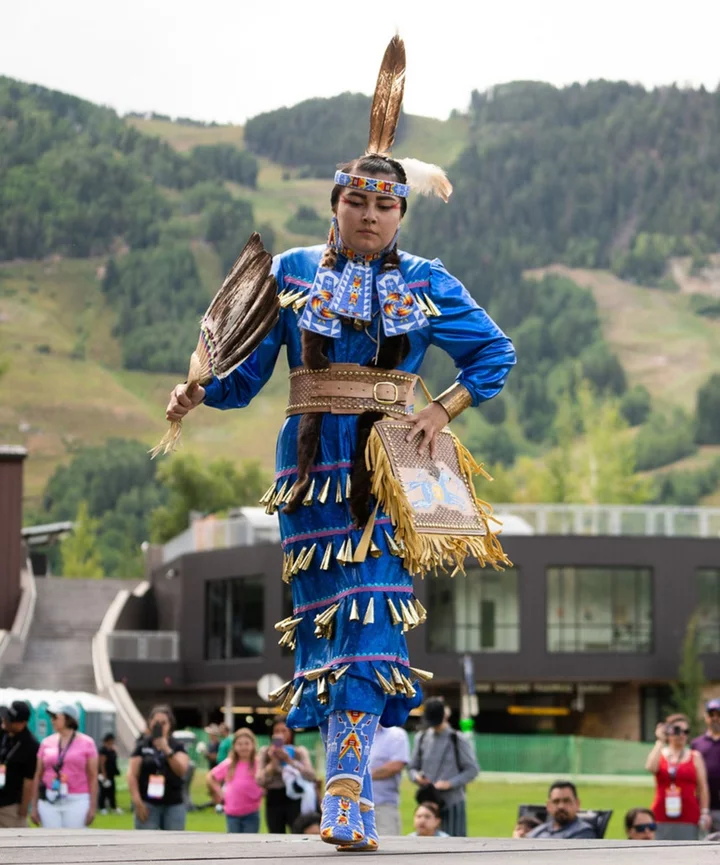At high altitudes, 7,908 feet above sea level to be exact, roughly 250 Latines gathered at Aspen Meadows Resort in Aspen, Colorado, in August for the second annual Raizado Festival by The Latinx House. Not far from the Rocky Mountains, the four-day event, stacked with programming that focused on Latine education, health, innovation, sustainability, leadership, and arts and culture, brought together an audience of Latine locals, international change-makers, and celebrities, from Francia Raisa to Jessica Marie Garcia.
You might be wondering why the hell an event with “rooted” in its title is taking place in a city where Latines are so vastly underrepresented instead of, well, Los Angeles, New York, Miami, or Chicago, metropolises where our roots have long been planted. There’s an explanation for that.
“This is a city where leaders convene from all around the world, but it’s also a very wealthy community. Yet our community, and other BIPOC folks, are completely invisible here,” social entrepreneur Mónica Ramirez, founder and president of The Latinx House, tells Refinery29 Somos. “So people who live here, who have businesses here, they reap the benefits of the labor of our community. And the question is, ‘what are they giving back?’”
“People who live here, who have businesses here, they reap the benefits of the labor of our community. And the question is, ‘what are they giving back?'”
Mónica RamirezThough Latines are the second-largest ethnic group in Colorado, the Latine population is only 7.67 percent in Aspen, according to DATA US. But just because Latines aren’t living in the very costly city doesn’t mean they are not working in it. Latines make up a large sum of the service workers behind Aspen’s travel and leisure economy. “To make a point, we had to do it here,” Ramirez adds. “We had to talk about the fact that there are people coming three hours away each-way, round trip to work here in the hotels and restaurants. So it was very intentional.”
Ramirez co-founded The Latinx House, a project of the nonprofit Justice for Migrant Women, with producers Olga Segura and Alexandra Martínez Kondracke in 2020 to support Latines in film and entertainment as well as uplift dialogue around pressing societal issues impacting the community. In 2022, they officially launched the Raizado Festival to bring this effort to a physical space where they could engage with Latine leaders.
Currently, Raizado Festival is an invite-only event where gatherers, ranging from celebrities, philanthropists, and business owners, pay a hefty ticket price that reaches as high as $1,800 to attend. Organizers, however, do provide the community and other attendees with discounted or free tickets.
Those who are invited experience a series of panel discussions, fireside chats, film screenings, musical performances, an award show, and more, all by and for Latine leaders. This year, Colorado State Representative Elizabeth Velasco spoke about political leadership; showrunner and director Gloria Calderón Kellett (One Day At a Time, With Love, The Horror of Dolores Roach) led a masterclass on writing compelling stories; and vice president and executive editor at One World Elizabeth Mendez Berry offered lessons on how to write a winning book proposal.
“I really appreciate the opportunity to get a feeling for the texture of the community here.”
Elizabeth Mendez Berry“I really appreciate the opportunity to get a feeling for the texture of the community here,” Mendez Berry tells Somos about her second time participating in the Raizado Festival. “I was a journalist for many years, I still feel like a journalist in my heart, and being a journalist is about getting out and talking to people and hearing from them, and I think one of the things that Raizado does really well is it gives you a feeling for the texture of the community that we’re actually present in.”
She continued: “By leading a workshop, like the one that I did, I get an opportunity to hear the texture of people’s lives. This group doesn’t represent all of us [Latines] by any stretch of the imagination, but it does represent a really interesting and complex grouping in itself.”
In many ways, the goal of the Raizado Festival is to expand representation and understanding of Latines, including the community in Aspen as well as the myriad cultures throughout Latin America and Latine USA. During the festival, there was a reception co-hosted by Afro-Colombian composer and actor Mauro Castillo (Encanto, Factor X) as well as a special performance by Guatemalan singer-songwriter Sara Curruchich, who is known for singing in her native language of Kaqchikel.
“What better way to foster growth for the folks within our communities than addressing the pressing matters that are glaring at us all?”
brenda barrientosStill, it must be noted, when taking a scan at each event room throughout the weekend, something was very noticeable: the lack of Black Latines in these spaces. From the speakers to the attendees, Black Latines were deeply missing. And while the festival’s programming was based on set pillars, there could have been room for uncomfortable conversations to be had. What better way to foster growth for the folks within our communities than addressing the pressing matters that are glaring at us all? What does accountability and growth look like for our own communities when space isn’t held for discomfort?
Ramirez says she’s aware of the underrepresentation and the need to address it within the spaces she’s building. “We’re not afraid to take those [topics] on, because if we don’t take them on, we have to deal with those issues within our own community. It’s not for other communities to tell us how to resolve the issues that are surfacing in our community,” Ramirez says. “We’ve started to do that work because we understand that it’s important, but we also have a lot more to do. And I never want to say that we’ve done enough there because I think there’s much more that we all need to be doing.”
There were, however, a handful of celebrity hosts. Among them was Honduran-Mexican actor Raisa. “When Monica and Olga asked me to [be a part of the Razado Festival], I said, ‘Of course,’ especially because it has to do with the Latinx community. I want to educate myself, I want to be involved, and I want to use my platform as much as I can,” she told Somos. “It’s a responsibility to use my platform to tell our stories of the things that are happening, both good and bad, and to connect with people, activists in particular, that I can help to create change. We really need it.”
Dominican-American actor Judy Reyes, who also participated in the festival, said her work at the festival felt necessary. “It’s a little emotional for me. I have a 13-year-old who is non-binary trans, and with everything that’s going on politically in this country — all the rights that they’re trying to strip away from people that have really worked so hard, and starting with the annihilation of actual history in Florida — we have to really fight to remind people that that’s not true,” she says.
“It’s a responsibility to use my platform to tell our stories of the things that are happening, both good and bad, and to connect with people, activists in particular, that I can help to create change.”
Francia RaisaFor Colombian actor Isabella Gomez, who moderated a panel discussion on sustainability and the environment, participating in the event offered her the opportunity to be in community. “A lot of my growth and a lot of my journey, per se, has been my community lifting me up,” the One Day At a Time actor says. “The more I learned about the Latinx House and what they do, and what they want to do with this, I was like, ‘Yeah, it’s a no brainer. We just all have to be here every year.’”
She says the festival felt very therapeutic — and not just for her. She witnessed many speakers get on stage and be vulnerable about their stories and emotions, something she wasn’t expecting, especially with the size of the festival. “That is not usually the case for events like this. I think it’s really healing,” Gomez says.
And that, too, is one of the objectives behind Raizado: to create a space where attendees are comfortable to bring their full selves, including the emotions they aren’t always able to express, and provide them with community and respite to work through those feelings.
For instance, the final days of the festival included several film screenings, including of the queer coming-of-age romance Aristotle and Dante Discover the Secrets of the Universe, as well as the Icon Awards ceremony, which featured performances by Castillo and Mexican powerhouse singer-songwriter Carla Morrison. On the last day, The Latinx House opened Raizado up to everyone in the community for free. Together, out-of-state attendees and locals enjoyed a musical performance from Los Lobos, a fashion show by Latine designers Cindy Castro, Mario de la Torre, and Lilian Lara, a book chat with authors Alejandra Campoverdi and Cindy Montenegro, and a flag football demonstration by Mexico’s flag football global ambassador Diana Flores.
“We’re going to be continuing to grow and addressing all of the necessary issues.”
MÓNICA RAMIREZThe intentions behind The Latinx House’s Raizado Festival feel genuine and meaningful, especially in the current political climate, but as an attendee, I left wanting more: more inclusion of marginalized Latines, more discussion on the social and political issues that are too often swept under the rug, and more of an understanding of the festival’s mission and long-term goals.
“We’re going to be continuing to grow and addressing all of the necessary issues because, truly, we do believe that there’s so much that we still need to do within our community. Our community is so big. There are so many cultures and so many of us,” Ramirez says.
The Latinx House’s third annual Raizado Festival is set to take place in August 2024 in Aspen.









